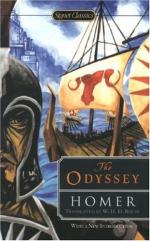Presently the sun set and it became dark, whereon the pair retired into the inner part of the cave and went to bed.
When the child of morning rosy-fingered Dawn appeared, Ulysses put on his shirt and cloak, while the goddess wore a dress of a light gossamer fabric, very fine and graceful, with a beautiful golden girdle about her waist and a veil to cover her head. She at once set herself to think how she could speed Ulysses on his way. So she gave him a great bronze axe that suited his hands; it was sharpened on both sides, and had a beautiful olive-wood handle fitted firmly on to it. She also gave him a sharp adze, and then led the way to the far end of the island where the largest trees grew—alder, poplar and pine, that reached the sky—very dry and well seasoned, so as to sail light for him in the water. {53} Then, when she had shown him where the best trees grew, Calypso went home, leaving him to cut them, which he soon finished doing. He cut down twenty trees in all and adzed them smooth, squaring them by rule in good workmanlike fashion. Meanwhile Calypso came back with some augers, so he bored holes with them and fitted the timbers together with bolts and rivets. He made the raft as broad as a skilled shipwright makes the beam of a large vessel, and he fixed a deck on top of the ribs, and ran a gunwale all round it. He also made a mast with a yard arm, and a rudder to steer with. He fenced the raft all round with wicker hurdles as a protection against the waves, and then he threw on a quantity of wood. By and by Calypso brought him some linen to make the sails, and he made these too, excellently, making them fast with braces and sheets. Last of all, with the help of levers, he drew the raft down into the water.
In four days he had completed the whole work, and on the fifth Calypso sent him from the island after washing him and giving him some clean clothes. She gave him a goat skin full of black wine, and another larger one of water; she also gave him a wallet full of provisions, and found him in much good meat. Moreover, she made the wind fair and warm for him, and gladly did Ulysses spread his sail before it, while he sat and guided the raft skilfully by means of the rudder. He never closed his eyes, but kept them fixed on the Pleiads, on late-setting Bootes, and on the Bear—which men also call the wain, and which turns round and round where it is, facing Orion, and alone never dipping into the stream of Oceanus—for Calypso had told him to keep this to his left. Days seven and ten did he sail over the sea, and on the eighteenth the dim outlines of the mountains on the nearest part of the Phaeacian coast appeared, rising like a shield on the horizon.
But King Neptune, who was returning from the Ethiopians, caught sight of Ulysses a long way off, from the mountains of the Solymi. He could see him sailing upon the sea, and it made him very angry, so he wagged his head and muttered to himself, saying, “Good heavens, so the gods have been changing their minds about Ulysses while I was away in Ethiopia, and now he is close to the land of the Phaeacians, where it is decreed that he shall escape from the calamities that have befallen him. Still, he shall have plenty of hardship yet before he has done with it.”




